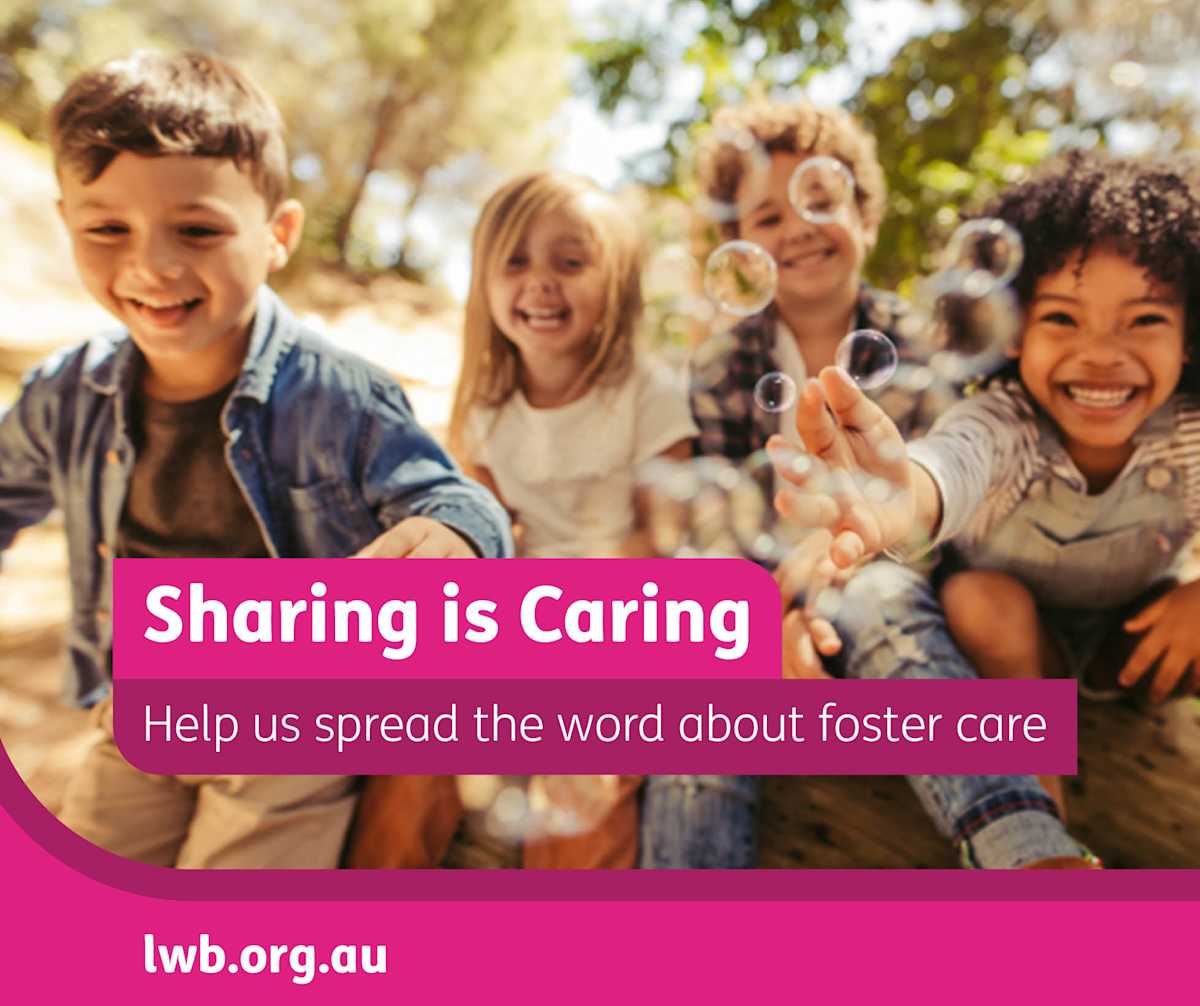
What is Sharing is Caring?
The Sharing is Caring campaign is a grassroots community engagement initiative designed to boost foster carer recruitment, harnessing the collective power of Life Without Barriers' staff. This year, the campaign has opened up to staff, carers and partners who are encouraged to take small, meaningful actions to raise awareness about foster care and kinship care in their local communities.
Whether that’s chatting with neighbours, dropping off flyers, or sharing social media posts!

“The rewards of being a foster carer are endless. You can be an amazing part of a child’s life, making a huge difference that could influence them forever.”
Sharing is caring is an annual initiative is a cornerstone of our commitment to raising awareness about the urgent need for more foster carers in our communities. It’s a chance for all of us to come together, share stories, spark conversations, and inspire action.
Downloadable resources
FAQs
Have questions about foster care or the Sharing is Caring campaign? You're not alone! We've answered some of the most common questions below.
Sharing is Caring FAQs
How can I participate in the campaign? By doing simple outreach activities during the campaign period. You could share a foster care post on social media, hang a poster in your local area, drop off flyers at a community centre, or talk to friends and family about fostering. Every action counts – just choose what you’re comfortable with and do it during the campaign weeks, then let us know (so we can count it!).
Who do I contact for more information about the campaign? You can email the campaign organisers at sharingiscaring@lwb.org.au
How do I access the campaign materials? All campaign materials are available right here on the this page. Above you will find links to a poster, social media pack, email signature, etc. Click the links to view or download the files. If you have any trouble accessing them, let the digital content team know.

Foster Care FAQs
What is foster care? Foster care provides children who can’t live with their own family a safe, temporary home with an approved carer.
Who can become a foster carer? People from all walks of life can become foster carers; singles, couples, renters or homeowners, as long as they have a stable home and complete the necessary checks and training.
Do I need to own a home to be a foster carer? No. You don’t need to own your home, renting is fine. What’s important is that you have a stable place with enough space (like a spare room) to care for a child.
Can single people foster? Yes. Single people can absolutely foster. You don’t need to be married or have a partner to provide a loving, supportive home for a child in need.
What support is available for foster carers? Foster carers receive training, a dedicated support worker, 24/7 on-call assistance, and access to respite care and support groups. In short, you’re never on your own – help is always available.
How long does the foster care process take? It typically takes a few months (around 6–12 months) from your first enquiry to becoming an approved carer. This includes training, background checks, interviews, and home visits to get you ready.
Can I choose the age or gender of the child I foster? You can express preferences for the age or gender of the child you’d like to foster. The team will consider your preferences when matching a child to your home, though being flexible helps since placement depends on the children who need care at the time.
What are the responsibilities of a foster carer? Provide a safe, nurturing home and take care of the child’s daily needs (like meals, school, and emotional support). Foster carers also work with our care team – for example, attending meetings and following the child’s care plan – to support the child’s well-being.
Is there financial assistance for foster carers? Yes. Foster carers receive a regular allowance to help cover the costs of caring for a child (for things like food, clothing, and school expenses). This means you shouldn’t be out-of-pocket for providing care.
How do I start the process of becoming a foster carer? Get in touch with our foster care team to start. You can call 1300 592 227 or fill in an online enquiry form. We’ll then guide you through the next steps – attending an info session, completing an application, training, and the assessment process to become a carer.

Image: Two people dressed as unicorns, standing in front of Story Bridge, holding up 'Become a foster carer' posters.
2024 Impact
In 2024, the campaign achieved:
430,000 flyers, postcards & magnets handed out in community and through letter box drops
5,000 posters visible in community
100’s of introduction emails, digital ads and posts
Over 30 events
100’s of conversations
Numerous media stories
Local business partnering
We reached around 500,000 people across Australia in a 3-month period (496,800)!

Who do I contact for information about Sharing is Caring?
You can email the campaign organisers at sharingiscaring@lwb.org.au.
For foster care questions, you can call 1300 592 227 or fill in an online enquiry form.